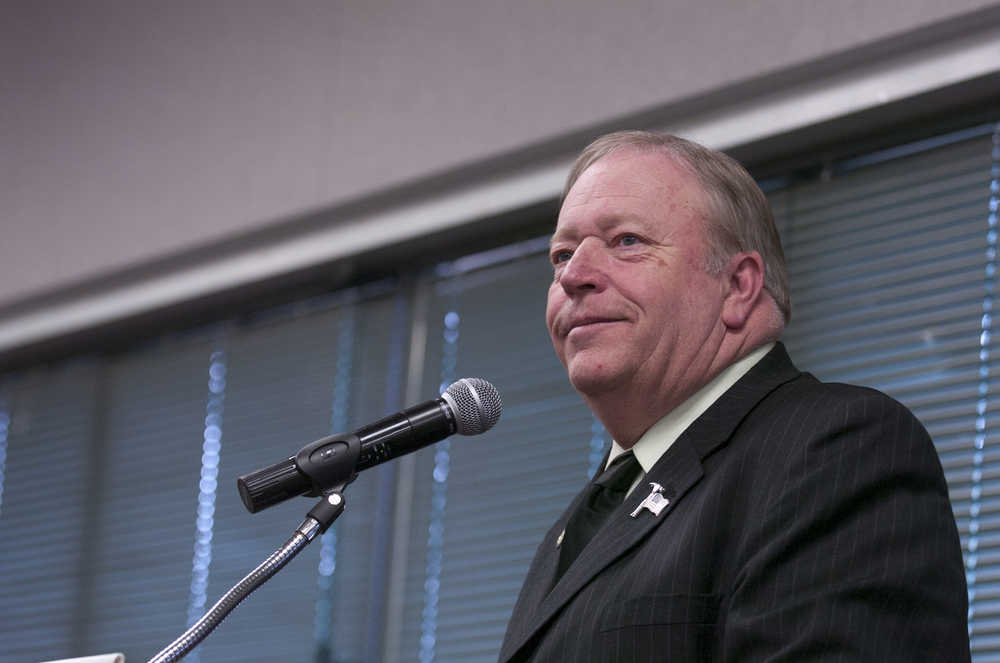Rocky Knudsen knows he will likely not win his race against incumbent Rep. Mike Chenault, R-Nikiski, for the State House of Representatives District 29 seat, but the Nikiski Democrat has an ulterior motive for running.
“I’m basically running so that people have a choice when they got to the polls,” Knudsen said. “I believe people deserve a choice.”
Voter participation is one of the issues that Chenault, who was first elected to the House in 2000, and Knudsen agree upon. The race between the two has been congenial — both candidates spoke well of each other as they characterized the last few weeks of their race.
“I’ve met Rocky on the campaign trail and he’s a nice guy,” Chenault said. “We’ve had numerous conversations about different issues in our area that are concern to people and you know, I commend him for running.”
Knudsen said he dislikes seeing candidates run unopposed.
“I think both of us want the same things and I think the only differences we have is on how we achieve the things that we want to do,” Knudsen said of his race with Chenault. “I guess what made me decide to run is to give people a little bit of a different perspective on things.”
Both men said there were several issues pertinent to the Kenai Peninsula that should draw voters to the ballot box, including the Alaska LNG Pipeline project. Currently, the pipeline’s terminus is planned to be at a proposed LNG facility in Nikiski.
“I’ve had numerous people asking me questions from wanting to find a map of the area the project is wanting to buy, how much water the project is going to use, how much noise it is going to create, how many people will be moving into the area and I’m going to continue to try to work on the … project and do everything I can to make it become a reality,” Chenault said. “I think it’s important for, not only the Nikiski area, but it’s important for the state.”
For Knudsen, an important part of the LNG project is the impact it could have on Alaska’s unemployment rate.
“I’d like to see it built. One of my big issues is Alaska hire and I’d like to see it be a project labor agreement with Alaska hiring requirements,” Knudsen said. “I think our non-resident workforce is too big in this state. Right now we’ve been hearing that there’s a boom going on Nikiski, but yet the unemployment rate is higher than it was one year ago.”
When it comes to campaign spending, Chenault has far out-raised Knudsen during this race.
According to his Alaska Public Offices Commission, or APOC, finance disclosure reports, Chenault raised nearly $22,000 in just over eight months in 2014; Knudsen raised just over $8,600 during the same time period.
Chenault, a longtime legislator, draws from a wide base of support, including donations from the president and chief executive officer of Northrim Bank, the CEO of the Alaska Gasline Development Corporation, to the president of Ocean Beauty Seafoods, and several political action committees including the Wells Fargo Bank Alaska PAC, Alaska Realtors PAC and the BP Alaska Employee PAC.
Chenault’s campaign also draws a significant amount of money from local contributors including real estate investor and prominent sportfishing advocate Bob Penney; Borough Mayor Mike Navarre; Udelhoven President James Udelhoven; Glenda Feeken, a real estate broker with RE/MAX; and Bruce Richards, external affairs director for Central Peninsula Hospital, according to his 2014 APOC filings.
Knudsen counts several labor-related organizations among his supporters including the Ironworkers L.U. 715; UA Local 367, a plumbers and pipefitters group; and the Carpenters Local 1281 legislative fund. He has also seen support from Kay Brown, executive director of the Alaska Democratic Party.
Knudsen has also contributed $5,000 to his own campaign.
As state revenues fall, funding to schools has been an issue that both candidates said they would like to see addressed during the upcoming session.
Chenault said it’s an issue that has been important to him for years and that he has fought for additional K-12 funding for the public school system.
“We need to do some fine tuning of it, but I’m willing to work with the school district and try to find the medium where the legislature feels right about funding education,” Chenault said.
Knudsen said he believed the state needed to find more sources of revenue so that it could support school districts at a sustainable level.
“I think we need, in the next three to four years, we need to get something going to increase revenue, because I think that’s about the time the state runs out of money,” Knudsen said. “We need to somehow give (the schools) the resources they need and I think that’s a very important part of our future.”
In addition to schools, Chenault said he was working on a piece of legislation to address Alaska Board of Fisheries and its members being unwilling to hold a full board meeting in the Kenai and Soldotna areas.
“We’re going to continue to try to pressure the government and the Board of Fish to have those meetings down here,” he said.
Both candidates said they hoped voters would make time to weigh in on Alaska politics on Nov. 4.
“I’d like them to vote for me,” Chenault said with a laugh. “But, if they’re not, at least — I’d like them to come out and vote. I think it’s important in our society that people voice their opinions … you really have a minority making the decisions on not only our state and local issues but the federal issues as well. I’d love for more people to get out and vote.”
Reach Rashah McChesney at rashah.mcchesney@peninsulaclarion.com.

